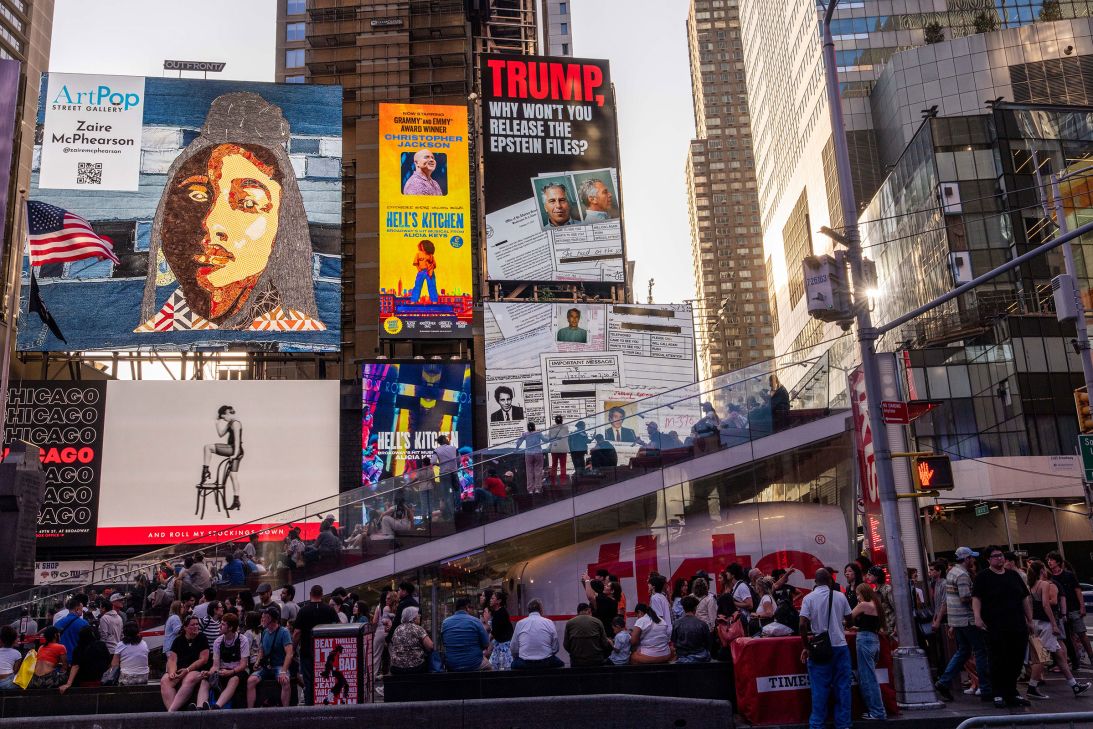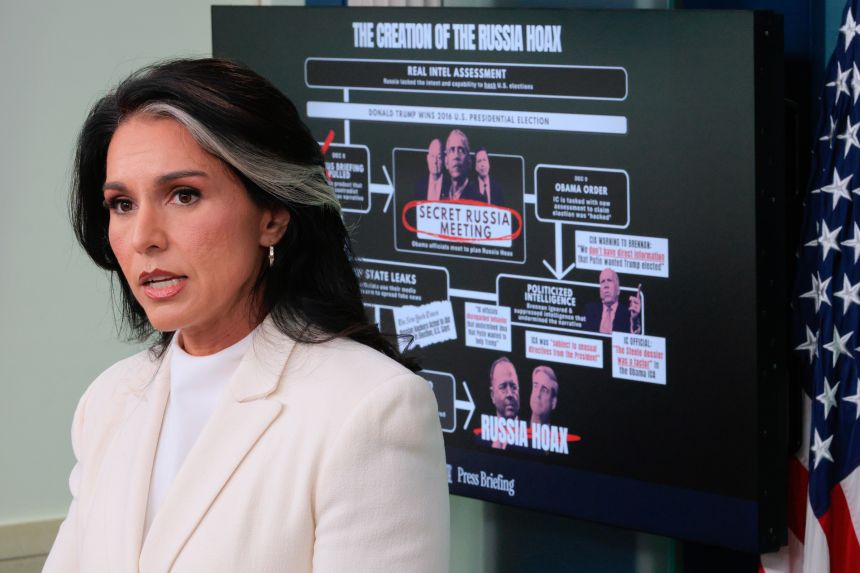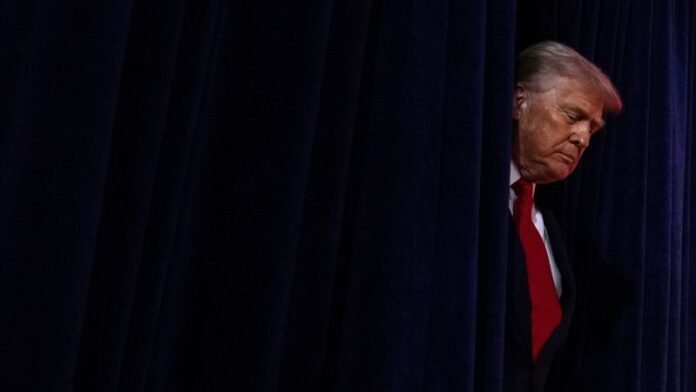The Jeffrey Epstein morass surrounding President Donald Trump is deepening amid growing defiance by some Republicans and despite the administration’s most inflammatory attempt yet at distraction.
New reports Wednesday that Attorney General Pam Bondi told Trump in May that his name appeared in documents related to the case of Epstein, an accused sex trafficker, offered a plausible explanation for the president’s growing fury over the drama.
They will fuel accusations of a cover-up since the administration has refused to release the files.
And although there is no evidence that Trump was involved in any wrongdoing or that he knew of Epstein’s criminal activities when they ran in the same social circle decades ago, there is bound to be intense speculation about the nature of mentions about the president in the investigative files.
The storm is also intensifying in Congress.
A vote in the House Oversight Committee to subpoena the Department of Justice for files related to Epstein worsened Trump’s political headache, since it revealed the appetite for more disclosure among some MAGA Republicans. The GOP-majority committee also voted to subpoena testimony from Epstein’s accomplice Ghislaine Maxwell, who is serving a 20-year prison term.
Trump responded to the ballooning crisis with the oldest trick in his political book, pushing a conspiracy theory against Barack Obama — a decade and a half after his false claims about the 44th president’s birthplace electrified his coalition and political career. He enlisted the top US intelligence official, Tulsi Gabbard, who misleadingly claimed in a theatrical White House appearance that Obama’s handling of Russian election meddling in 2016 amounted to a coup to destroy Trump’s first presidency, a day after her boss accused his predecessor of treason.
There is no evidence that Trump did anything wrong or illegal in his interactions with Epstein. But days of stalling by the White House and new disclosures drove speculation to a fever pitch over their relationship in the 1990s and early 2000s, long before the wealthy financier was charged with sex trafficking and abuse and died in prison in 2019.
The frantic confluence of events Wednesday underscored Trump’s failed attempts to put a lid on the Epstein drama, the most serious challenge to his authority over the MAGA base in either of his administrations. In fact, the storm is now gathering its own momentum, and it’s increasingly hard to see how the president calms it.
The controversy is overshadowing Trump’s recent political successes, including trade deals he announced with Japan and the Philippines and recent legal victories enabling a key goal: the gutting of swaths of the federal government. And it’s outracing House Speaker Mike Johnson’s attempts to contain it.

Among developments on Wednesday with the greatest capacity to damage Trump politically were revelations that Bondi warned him in May that his name appeared in documents related to the Epstein case.
The conversation, which also included Deputy Attorney General Todd Blanche, was characterized by two White House officials as a “routine briefing” that covered the scope of the Justice Department’s findings. Trump’s name appearing in the files, they said, was not the sole focus of the discussions. Bondi also told Trump that several other high-profile figures were mentioned. She also briefed that investigators did not find evidence of an Epstein client list or that suicide was not his cause of death — two key elements of a MAGA conspiracy.
Simply being mentioned along with hundreds of others in documents does not imply wrongdoing by the president. And White House communications director Steven Cheung said in a statement to CNN that Trump had kicked Epstein out of his Mar-a-Lago club because he regarded Epstein as a “creep.”
Still, details of Bondi’s briefing, first reported by the Wall Street Journal, offered new context about the political controversy that erupted over the Epstein files, since it took place three months after Bondi raised huge expectations for disclosure by telling Fox in February that she had Epstein’s client list sitting on her desk.

It’s hardly a surprise that Trump was mentioned in the Epstein files, since his former friendship with the disgraced financier was well known. The men were pictured together on multiple occasions. And Trump’s name was included in flight logs of Epstein’s plane that were among documents released by Bondi earlier this year in a political stunt meant to reward conservative bloggers.
But Wednesday’s revelations are politically difficult for Trump since they will renew speculation that the administration’s refusal to release Epstein documents, as his top aides promised on the campaign trail, is motivated by an attempt at a cover-up.
Now that it is established that Trump’s name is in the documents, speculation will go into overdrive on the nature of the mentions and whether they add to the public knowledge of Trump’s ties to Epstein and whether he knew anything about the offenses with which the financier was later charged. Again, this does not imply Trump himself did something wrong. But since he’s the sitting president, the focus on him and his handling of the Epstein matter in government will be intense.

This is especially the case since Bondi and Kash Patel, who now heads the FBI, had vehemently demanded the release of Epstein documents before finding themselves on the other side of the conspiracy theory they had puffed up when they took top jobs. Their agencies issued a joint statement earlier this month saying that there was no evidence of a client list or to support the conspiracy theory that Epstein was murdered.
But the pattern of inconsistencies and denials that typically fuel Washington’s scandal machine are piling up. Trump, for instance, appeared to deny this month that Bondi had told him his name was in the Epstein files, which he then claimed were made up by Obama and fired former FBI Director James Comey.
Ironically, the growing clamor is a test case of why grand jury material and other documents are typically sealed. That’s partly out of a need to protect the reputations of people — including witnesses, victims and blameless third parties — who are identified during an investigation but are not charged with any offenses.
But the MAGA movement is obsessed with conspiracy theories and has a bedrock belief that Washington is run by a cabal of “deep state” elites who suppress the truth. This tempted Trump, Bondi and other officials to tap into the political well and to promise the release of previously sealed information on famous cases also including the assassination of President John F. Kennedy.
When the administration then refused to make public all the evidence about Epstein, top officials looked like they’d become avatars of the deep state they once decried.
As anger built in the MAGA base, the Justice Department launched an effort to get court permission to unseal grand jury testimony in the case. But a federal judge in Florida on Wednesday ruled against the release of material that represents only a small portion of the thousands of documents in the Epstein case file. The DOJ move is a legal long shot, but it may still serve the purpose of building political cover for the administration as supporters demand more transparency.

Trump’s growing nightmare was exacerbated in a rare show of defiance by Republicans in Congress on Wednesday.
A subcommittee of the House Oversight Committee voted 8-2 to subpoena the Department of Justice to release files related to Epstein. Republican Reps. Nancy Mace, Scott Perry and Brian Jack joined with Democrats in a revolt against Johnson’s leadership.
House Oversight Committee Chair James Comer, meanwhile, subpoenaed Maxwell, a day after Blanche, Trump’s former personal lawyer, announced that he’d visit her in prison to see if she has more information on Epstein’s offenses. Blanche’s move raised alarms because Trump, with his pardon power, could commute her sentence or pardon her, suggesting an incentive for Maxwell to offer testimony that might help him. CNN’s Kaitlan Collins, citing two people familiar with the meeting, reported that it is expected to take place on Thursday.
The actions of the Oversight Committee suggested there is genuine desire for more accountability among some Republicans despite the possibility that it could inflict political damage on the president.
This suggests that any hopes harbored by Trump and Johnson that the furor might abate over the summer recess will prove to be ill-founded.
Johnson has accused Democrats of playing political games over Epstein, since the documents they now want released were not made public during the Biden administration. And he denied that his attempt to shut down House votes on the matter before September meant he was losing control of his conference.
“No one in Congress is blocking Epstein documents. No one in Congress is doing that,” the speaker said Wednesday. “What we’re doing here, Republicans are preventing Democrats from making a mockery of the Rules Committee process because we refuse to engage in their political charade.”
But Senate Minority Leader Chuck Schumer taunted Johnson, accusing him of “skedaddling out of town early.” The New York Democrat added, “If the speaker thinks he can make the Epstein escapade disappear by sending folks home early, he’s got another thing coming.”
The looming political question is whether fury over the Epstein saga among prominent MAGA media figures and influencers is mirrored more broadly in Trump’s base. Summer recess town halls involving GOP members could begin to answer that question. A Quinnipiac poll released on July 16 showed splits on the issue. While 40% of Republicans backed how Trump was handling the issue, 36% disapproved. But a CBS/YouGov poll Sunday showed that only 11% of Republicans said Epstein-related issues matter a lot to how they evaluate Trump’s presidency.

Trump has responded to the building Epstein scandal with increasingly heated attempts to distract attention and to provide alternative programing for the conservative media universe.
Gabbard’s appearance in the White House briefing room on Wednesday represented the most striking effort yet to weaponize elements of the federal government to advance Trump’s personal political aims.
The director of national intelligence declassified a highly sensitive congressional report written by Republicans in the first Trump presidency to bolster her claim that the Obama team plotted to ruin her boss’s first administration with its investigations and public statements on Russian election meddling.
“The evidence that we have found and that we have released directly point to President Obama leading the manufacturing of this intelligence assessment,” Gabbard said. She focused in particular on the report’s conclusion that an intelligence community finding that Russian President Vladimir Putin developed a preference for Trump in 2016 and wanted to help him win was based on poor sourcing.
“They knew it would promote this contrived narrative that Russia interfered in the 2016 election to help President Trump win, selling it to the American people as though it were true,” Gabbard said.

While there was a debate among intelligence analysts about Putin’s intent, Gabbard’s presentation represented an attempt to cherry-pick evidence that is not reflected in other congressional and government assessments of Russian election meddling.
The overwhelming consensus in Washington, including from a report released in 2020 by the Senate Intelligence Committee on which Secretary of State Marco Rubio served, is that Russian interfered in the 2016 election to help Trump win and to hurt Democratic nominee Hillary Clinton.
The documentation that Gabbard produced did not back up Trump’s absurd claims of treason by Obama or her own assertion that there was an orchestrated plot to discredit Trump. Democrats accused her of jeopardizing the safety of US intelligence sources and offering valuable information to the Russians while sending a message to assets that it was not safe to report politically sensitive information.
Even if Obama did something wrong, Trump’s argument that he should be in prison would be undercut, ironically, by one of his own famous legal victories. Last year, the Supreme Court ruled in a case related to Trump’s indictment on charges of election interference related to the 2020 election that ex-presidents enjoy substantial immunity from prosecution.
The choreographed outrage in the White House briefing room, meanwhile, showed that the Russian election-meddling controversy — one of Trump’s greatest obsessions — is back and is sowing yet more division and mistrust among voters. Gabbard’s decision to revive it was a reminder that Putin’s scheme was one of the highest-yielding, lowest-cost intelligence operations in history.






